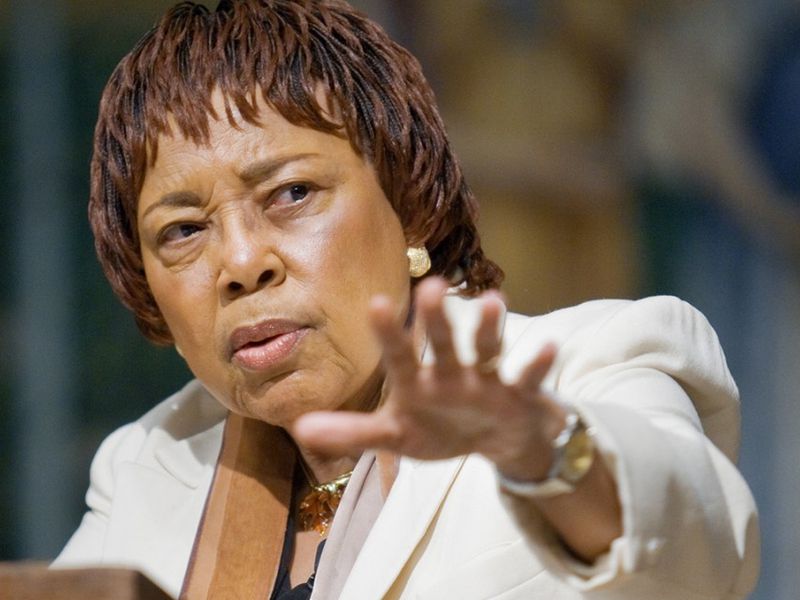
Dorothy Cotton at Cornell University, Cornell Daily Sun
The late Dorothy Foreman Cotton (June 9, 1930 – June 10, 2018) is among the most important unsung leaders of the Civil Rights Movement, having worked closely with Dr. Martin Luther King Jr. and with other women whose roles in the movement have often been overlooked. As director of the Citizenship Education Program of the Southern Christian Leadership Conference, she led workshops that moved thousands of Black people into civic action and organizing. She also helped to organize marches and protests to end segregation, in the process suffering beatings by white supremacists. Cotton was a firm believer in the philosophy of nonviolence as a way of life that “required self-discipline, bravery, compassion, and conscience”
Residing in Ithaca since 1982, on these traditional homelands of the Gayogo̱hó:nǫˀ (Cayuga Nation), Cotton served as director of student activities at Cornell from 1982 to 1991. In 2008, Cotton helped found the Dorothy Cotton Institute. She cared deeply about the current state of affairs and how to contribute to a 21st century movement for human life, dignity, and freedom around the world. We at DCI find great hope and inspiration in the solidarity and persistence of those who build paths toward peace rather than war, oppose violations of human rights wherever they occur, and strengthen hope that another way to live together is not only possible, but imperative.
During these consequential times, we share her reflection on what she learned about movement-building and organizing for freedom.
In Dorothy Cotton’s (2012) own words:
One day not long ago I felt a strong desire to revisit the Dorchester Center [in Georgia], where great, important work happened – work that helped change our country…. As I stood in the room where we gathered regularly each month for eight years, I saw and felt the energy of those times again …. I was not conscious then of the great importance of our work, that it would be studied and written about for generations to come. We had a fire in our souls and just had to do what we did. I know now that when I took other jobs, I was just taking a break from what I was called to do. I was transformed forever, just as our eight thousand participants were also transformed by involvement in a people-changing, country-changing experience.
Standing in the great room at the Dorchester Center caused me to consider some specifics of what we learned there:
♦ We learned that we could make the road by walking it. We didn’t know everything up front. There was no blueprint.
♦ We learned that we had, and still have, more power than we knew. The more we got involved, acted, and came together, the stronger we felt. We realized a new definition of power.
♦ We learned that we could change patterns and structures, no matter how deeply entrenched they were.
♦ We learned that we could use our impatience and anger to empower ourselves to act for change.
♦ We learned that we could confront the powers that be from an understanding of nonviolence—satyagraha, as Mahatma Gandhi called it.
♦ We learned that we could develop whatever skills we lacked when there was work to be done.
♦ We learned that we could act from our capacities, rather than from some deficit attributed to us by others.
♦ We learned that we have government “by the people” only if we make it so, giving life to this great concept.
♦ We learned that one is not alone. If one takes some steps to bring about positive change, others will join in the action.
♦ We learned that when we are serving, giving our life and energy to something that is important to us as well as to others, life is meaningful. And that we can’t be bored giving ourselves to positive, transformative work.
♦ We learned that our freedom struggle was an idea whose time had come. As Dr. King liked to say, “The zeitgeist was upon us.” The spirit of the times unfolded with breathtaking power.
♦ We learned that when those who are victimized become committed to changing an unjust and brutal system, no longer accepting victim status, change happens. Systems that maintain patterns of injustice will have to change.
Source: Dorothy F. Cotton, If Your Back’s Not Bent: The Role of the Citizenship Education Program in the Civil Rights Movement, Atria Books, 2012, pp. 279-84.
The Dorothy Cotton Institute: https://www.dorothycottoninstitute.org/
DCI is a project of the Center for Transformative Action.